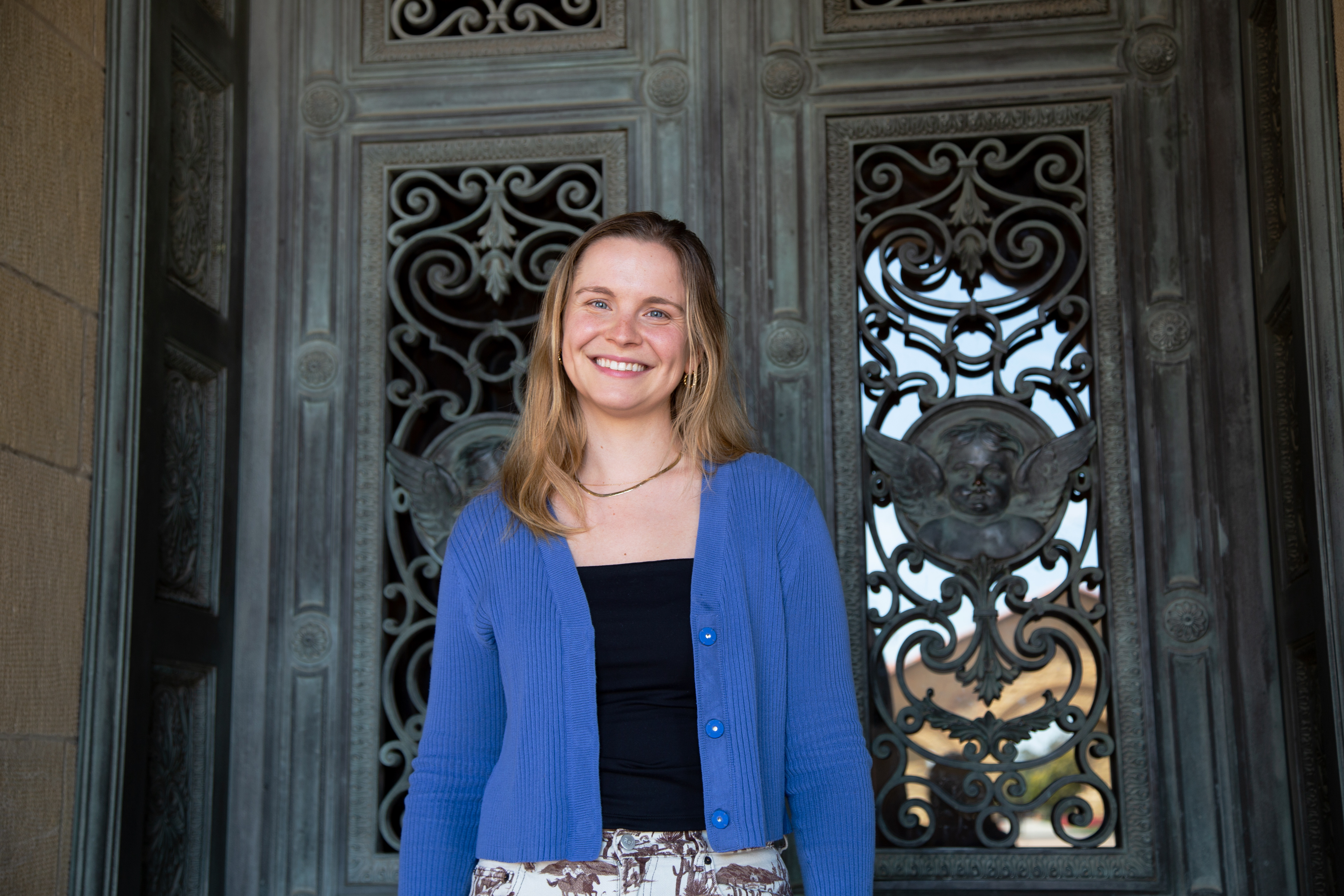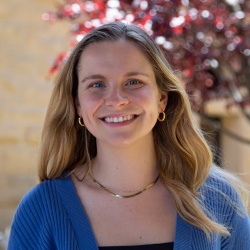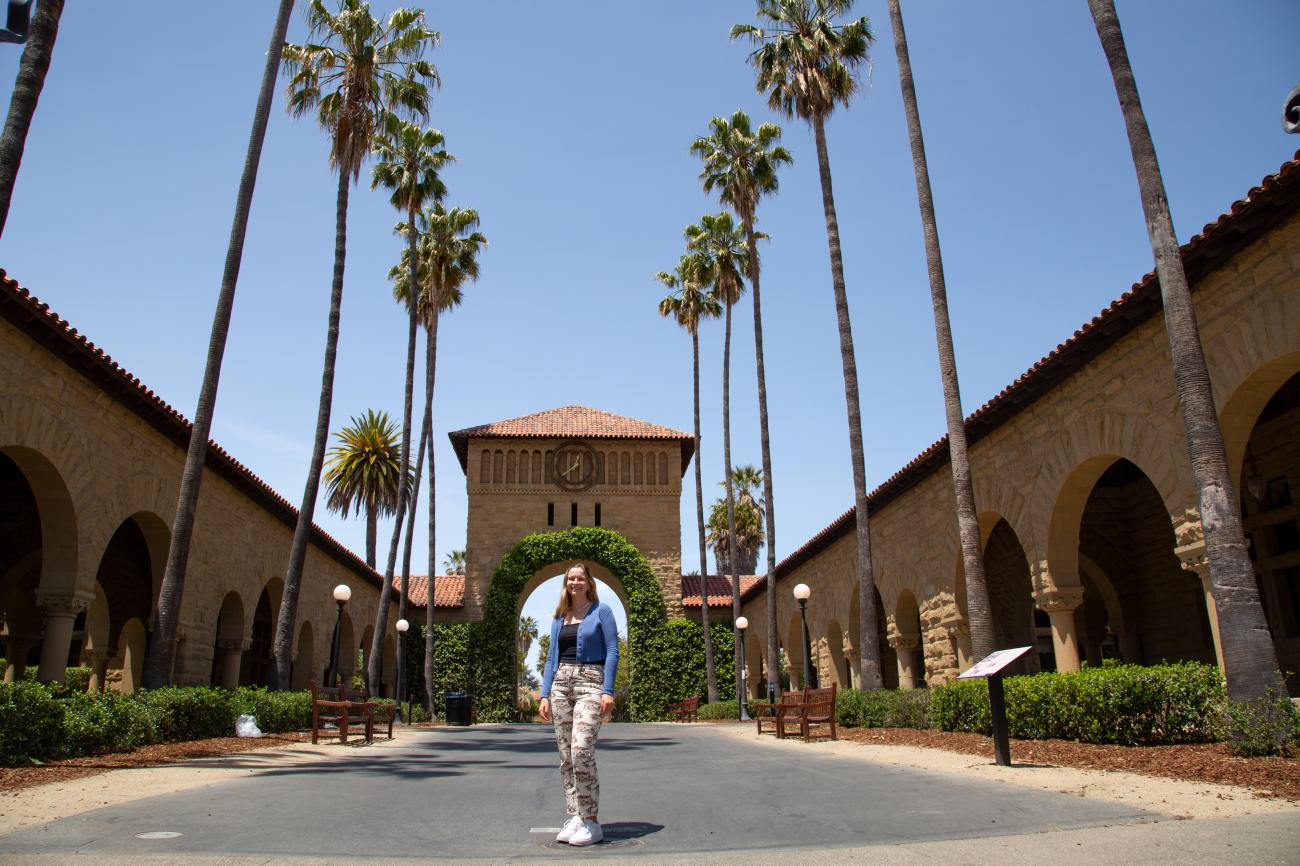
Gerta “GG” Guitart
You’ve arrived at spring quarter! How would you describe your experience so far?
My experience so far has been a lot like a balance beam—balancing new learnings, classes, and opportunities, as well as a new network of friends in the GSE community. All super exciting, but also can be challenging and I feel spread thin at times.
Describe LDT.
LDT is a unique niche yet broad program that challenges students to learn critical learning frameworks and apply them during the design process. Though the teachings and opportunities of the program are impactful, the thing I’m most grateful for is my cohort—a diverse group of students from a variety of backgrounds, each with a unique perspective that has contributed to my learning process.
Is there some time that you’ve spent with a member of the GSE faculty that is memorable?
My advisor, Jason Yeatman, took me around campus one of the first weeks of the fall quarter. I hadn’t had a more in-depth tour of the campus before, and he took me around the Main Quad and told me about some history. Additionally, we talked in depth about reading assessments, a topic I was excited about before applying to LDT. Our discussion about the power scaled assessments could have for schools that test or don’t test for learning disabilities was especially exciting. Like many conversations I’ve had at Stanford, I left that walk feeling giddy about the possibilities.
Why Stanford?
Just like during the undergraduate college selection process and selecting a major, I was incredibly indecisive coming into grad school. Though I did an ample amount of research and had been looking into LDT three years before applying, I wasn’t actually convinced until I spoke to an alum of the program. Their depiction of the capstone project solidified my decision to come to Stanford—the ability to spend such an extended amount of time on need-finding, using informed design principles coming in from the d.school, and being guided by learning theories as a framework for productive solutions sounded exhilarating for me.
How would you describe the other students in your cohort?
The funniest thing about my cohort is that everyone has a niche—all of my cohort mates have a unique interest in the field. The diversity in interests makes for very productive conversations and feedback loops, for which I am grateful.
What drew you to education?
I come from a family of dyslexics in STEM so I was always curious about neurodiversity and how we learn differently. What sealed my interest was my experiences in college doing learning science research at the Delta Lab at Northwestern University. I was amazed at the CS+LS [computer science + learning science] students building and testing out their creations.
What were you doing prior to applying to the GSE?
Right before LDT I was working as a UX software engineer at a start-up. Prior to that I was working in strategy and research at an edtech start-up.

What are your career plans and goals?
I hope to bring my technical background and foundational learning science from LDT into product and program management. I’m not tied to any field, but I want to solve problems I’m excited about, for example, technology that can scale to impact students with learning disabilities or computer science equity.
What advice do you have for students who are trying to decide whether to attend the LDT program?
My first thought is, go where it makes sense for you. I decided on Stanford because of the projects that were calling my name. For others, there could be other priorities: How do you learn? What classes are you looking to prioritize? Do you want to take some classes in different schools/subjects? What are the alumni networks you’re hoping to connect with? There are multiple avenues, just prioritize what works best for you.
Any tips for incoming students to help them get the most from their time at Stanford?
Oh so many! My first thought is to talk to as many alumni/current students as possible to get some tips on life here: Where’s the best dorm? (I made that mistake.) What’s the most efficient way to get to the airport? Where can I get a bike for cheap? All of the best tidbits of info I got from alumni or current students. Use the Stanford network!
What do you do to relax and have fun?
I love hiking near campus, eating outside with friends, and making myself overly complex meals.
Can you share a particular moment in your time at Stanford when you learned a lesson that will stay with you?
On my first day of orientation, Karin [Forssell, LDT program director] really pushed us to reflect as much as possible during our time here. She shared wisdom from teaching: that the most productive learning comes during reflection. This concept was reiterated to me multiple times throughout my time in the GSE—the power of introspection and reflection during times of learning. Though this is hard to balance at some points in life, this repeated message has helped me maintain some of the key learnings I’ve had in my time at Stanford.
Any other thoughts you’d like to share?
Remember that your experience at Stanford or any graduate school is uniquely your own. There are numerous opportunities that you may not know about until you reach that point or talk to the right people. Use your network and follow your curiosity. Grad school is a little gym for your brain.

Photos by Sofiia Kukhar
